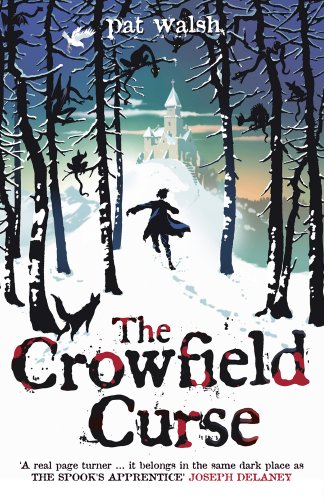
The Crowfield Curse by Pat Walsh
Order Crowfield Curse from Amazon Here
The setting is 1347 and Will is an orphaned boy who is forced to work amongst the Crowfield monks. One day as Will is given the task of gathering firewood in the forest he comes across a small creature who has been wounded by a fox trap. Although the creature looks like a small cat it is anything but a cat it turns out to be a hobgoblin and not every human can see him.
As a favor to Will for rescuing him, the hobgoblin reveals a secret that the Abbey has been keeping for over 100 years. In the back of the abbey, buried deep below the ground is an Angel. This secret brings a lot of questions up for Will. How can an Angel die? What secrets does the Abbey hold that he doesn't know? What could be so evil to actually kill an Angel? And who is this strange man that is visiting the abbey when the abbey hasn't had visitors in years? Is Old Magic making a come back?
The Crowfield Curse was a bit of a mixed bag for myself. While the story and plot seemed interesting, the novel was written in a very middle grade style. The font in the book is huge and the chapters are about 5-10 pages long making this a really quick read.
So here is what made Crowfield Curse a mixed experience for myself. First, the novel starts off very slowly. It details things that I had already learned on the back flap of the book. It wasn't until the halfway point that readers were introduced to other elements outside what was already told. Once those elements were given the book really did pick up. The characters have a bit of personality but don't expect anything too deep or detailed.
What I really enjoyed about Crowfield Curse was the mixture of a medieval setting, the fey and Christian themes. While the Christian themes were spread throughout the novel, it didn't seem forced and really worked for the story. I thought the whole last half of the book was a unique twist and combo of Old Magic and fey stories.
If you are looking for an easy read or children's story that is fairly well written, then Crowfield Curse will give you that. It is a first book of a series and I look forward to what Old Magic will be springing up on Will in the next novel.
The Crowfield Curse stands at 336 pages and was released September 1, 2010 by The Chicken House, a division of Scholastic. It is a mixture of medieval abbey, mystery, old magic and Christian lore.

No Such Thing As Dragons by Philip Reeve
Order No Such Things As Dragons from Amazon Here
Ansel is a mute boy who is sold by his father to a dragon hunter. Ansel has been mute ever since his mother died a number of years ago. Brock is the dragon hunter who goes from village to village in shiny armor, telling tales of how he destroyed dragons and hunted them down. Although Brock tells these villages that he hunts dragons, everyone knows there really is "no such thing as dragons".
While Brock takes Ansel to a small village in an effort to dupe a village into believing he is hunting dragons, Brock and Ansel run into a mysterious creature that really does look like a dragon. But it can't be a dragon, because dragons don't exist..... or do they?
No Such Thing As Dragons is 192 page novel that was released September 1, 2010 by Scholastic, Inc.
I'm a dragon lover and have been for a while. Give me any book with a dragon and I'll read it. I've even been known to read picture books with dragons! However, this novel just didn't do it for me. Here's why.
There is a lot of emphasis on religion. While it didn't bother me, it was really packed in there. I sorta felt that, the time that was focused on religion could have been spent on something else like developing characters. I just don't believe in a book that is geared for grade 4 through 6 there should have been such an emphasis on God and the Devil and why these things were part of the Devil.
The major drawback for myself was that this whole book was almost told to the reader. It didn't feel as if I was experiencing the story with the characters and instead I was told what had happened to them. There is very little dialogue and at one point in the novel it jumped between 4 different characters in a 2 page span. It just seemed like so much was packed into the novel in such a short space.
The good parts of the book were the descriptions of the travels. Such as when the characters were on the mountain. I loved the descriptive feel of the book and just wished that there was some dialogue mixed in with it.
This is definitely a short, quick book for young readers. There isn't anything that really stands the book out from any other books about dragons but it would be a great intro reader for younger readers looking for a mystery and easy read.
